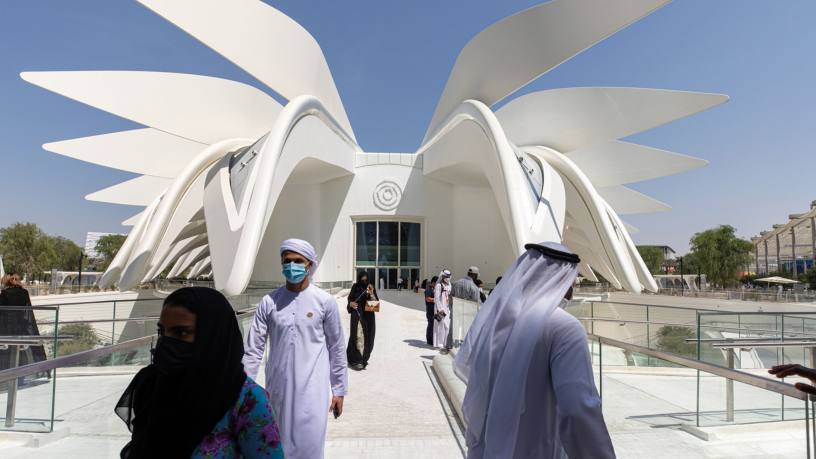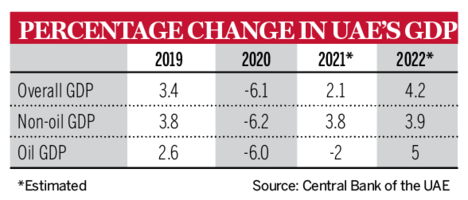After posting its deepest contraction since the 1980s in 2020, the UAE’s economy — the second largest in the Middle East — stabilised in 2021, as vaccine rollouts and a recovery in the global economy eased pressure on government finances.
The recovery is set to gain further momentum in 2022, on the back of higher oil revenues and improvements in tourism numbers, complemented by one of the world’s most advanced Covid-19 vaccination programmes. This is despite ongoing concerns over the country’s real estate sector.
After shrinking by 6.1% in 2020, the economy is forecast to grow by 2.1% in 2021 and 4.2% in 2022, according to the Central Bank of the UAE, as oil revenues and tourist arrivals continue to recover. After running a consolidated budget deficit of 2.4% of gross domestic product (GDP) in 2020 — its first since 2017 — the country’s finances are likely to post a 1.2% surplus in 2021, according to predictions from Emirates NBD, the country’s second-largest bank by assets.
“While the near-term outlook is clouded by the surge in coronavirus cases, the UAE’s high vaccination rate and relatively young population stand it in good stead to be able to withstand the current wave of infections without needing to reimpose the strict measures implemented [at the start of the pandemic],” says Khatija Haque, Emirates NBD’s head of research.
Oil rebounds
The country’s oil sector is set to return to growth in 2022 after two difficult years, with the Central Bank of the UAE predicting a growth of 5% for the year ahead (see table).
After slumping to below $30 per barrel in the early days of the pandemic, oil prices recovered to pre-pandemic levels in early 2021, with vaccine rollouts prompting rosier global economic growth forecasts. In recent months, markets have largely shrugged off concerns over the spread of the new Omicron variant, with oil trading around $85 per barrel in early January.
Morgan Stanley has forecast prices to rise to $90 per barrel in the second half of the year, thanks to a combination of low inventories, low spare capacity and low investment across the industry in the past few years. Such bullishness is not universal however, with Capital Economics forecasting prices to fall to around $60 per barrel by the end of the year, as supply increases and demand normalises.
Regardless of the movements in price, UAE oil revenues are set to increase significantly during the coming year. The country’s production quota is set to rise to 3.65 million barrels per day — its highest level in more than three years — as part of an agreement reached with the OPEC+ group of oil producers in July 2021, with further increases being a real possibility.
“The realignment of quotas in April is worth watching as there will likely have to be another reset, given the growing inability of some members to meet their targets,” says Robin Mills, CEO of Qamar Energy.
Covid response
The UAE entered the Covid-19 pandemic in early 2020 in an already weakened state, with declining real estate and construction sectors constraining local business activity. Beyond the collapse in oil revenues — which accounted for 25% of GDP in 2019 — the pandemic had a sudden and severe impact on international trade and tourism, two integral parts of the country’s economy.
Authorities provided Dh388bn ($105.6bn) worth of stimulus to boost the local economy in 2020, including a Dh50bn targeted economic support scheme to boost liquidity in the banking sector, a scheme that has been subsequently extended until at least June 2022.
Significantly, the UAE began its vaccination campaign early, offering Sinopharm jabs from early December 2020, with the country’s entire population receiving one vaccine dose by late November 2021 and 90% having received two doses. While international and domestic travel restrictions remain in place, the high vaccination rate enabled the economy to largely re-open in 2021.
“The vaccination programme gives the country a blanket of protection going forward that should enable the economy to carry on as normal,” says James Swanston, a Middle East and north Africa economist at Capital Economics. “There has been a rise in cases due to Omicron, but so far there have been very few deaths and little pressure on the healthcare system.”
The country’s average non-oil Purchasing Managers’ Index for the fourth quarter of 2021 was the highest since the second quarter 2019, pointing to faster GDP growth in the final quarter of last year, says Ms Haque.
While schools announced a delayed return to in-person teaching in early January, new lockdowns have been discounted by authorities.
“Omicron is way less impactful than the Delta [variant] and even during Delta we haven’t locked down the country,” the UAE’s minister of state for foreign trade, Thani bin Ahmed Al Zeyoudi, told Bloomberg TV in mid-January. “The balance has been there throughout Omicron for sure, [and] we will not go back to a full lockdown of the country.”
Tourists start returning
The re-opening of the local economy and high local vaccination rates are particularly important for the tourism sector, which is concentrated in the country’s second-largest emirate of Dubai. Tourism in the emirate — famed for its hotels, shopping malls and beaches — fell from 18% of Dubai’s GDP in 2019 to 13% in 2020, according to data from S&P Global Ratings.
Visitor numbers have subsequently improved as travel restrictions ease worldwide. Dubai hotels saw occupancy and room rates hit their highest levels since 2015, according to data from STR.
“The latest data from the Department of Economics and Tourism shows that international visitor numbers to Dubai in November had recovered to almost 76% of 2019 levels and the December data is likely to show further improvement,” says Ms Haque.
Key to the recovery in tourist numbers has been Dubai’s long-anticipated hosting of Expo 2020. After a 12-month postponement, the six-month fair — the first world expo to be held in the Middle East — opened its doors in October, attracting nine million visitors (around a third from outside the UAE) in its first three months.
Beyond its temporary boost to tourism numbers, authorities have seen Expo 2020 as a driver of economic growth long after it closes its doors for good at the end of March 2022.
Preparations for Expo 2020 have anchored infrastructure investment in Dubai over the past decade
“Preparations for Expo 2020 have anchored infrastructure investment in Dubai over the past decade, supporting GDP growth in the emirate even as sharply lower oil prices pushed other Gulf Co-operation Council states into recession [in 2017],” says Ms Haque.
“The transport, leisure and hospitality infrastructure that has been built over the past 10 years with Expo 2020 in mind will provide a platform for growth in the tourism and services sectors for years to come.”
The high hopes of authorities for a longer-term economic boost from Expo 2020 are likely to fall short, even if the event does come close to its target of 25 million visitors, and may even undermine Dubai’s fragile real estate sector even further.
“While there’s no doubt it has provided a boost in terms of tourism numbers, the impact is likely to be short-lived,” says Mr Swanston.
“What’s more, it could leave high rates of overcapacity in Dubai’s real estate and hospitality sectors in its wake that could ultimately reignite concerns about the debts of the emirate’s government-related entities.”
Real estate prices — which had seen a steady decline since 2014 due to a combination of oversupply and weaker economic conditions — turned a corner in 2021, spurred on by work-from-home trends, more attractive yields and reforms to the country’s visa regime. The value of property deals in Dubai more than doubled in 2021 compared with 2020, according to local listings portal Property Finder, marking their highest level since 2009.
Yet Dubai prices remain around 20% below their 2014 highs, according to Savills, with around 78,000 units set to be delivered before the end of this year.
Diversification strategies
Already one of the most dynamic economies in the Middle East, the UAE is continuing to pass bold reforms to attract investment and talent from around the world. While such measures are part of a decades-long economic liberalisation trend, the reform agenda has accelerated in recent years in response in part at least due to a similar, albeit more recent agenda in Saudi Arabia. The neighbouring country, which has launched the most comprehensive reform programme in its history in the past five years, is increasingly leaning on businesses to shift their regional headquarters from Dubai and Abu Dhabi to Riyadh.
The UAE liberalised its residency rules as part of its ‘Projects of the 50’ programme, which was launched in September 2021 to mark its golden jubilee. The new rules are aimed at attracting skilled workers by introducing a ‘green visa’ programme for business owners, investors and entrepreneurs, along with retirement visas for expats aged 55 and over. The UAE has also implemented changes to its commercial company law, allowing 100% foreign ownership of onshore companies in certain sectors for the first time.
The most eye-catching of the most recent reforms came in December 2021, when the government announced that schools and government entities would adopt a new weekend of Friday to Saturday, a shift from the Thursday to Friday weekend in place across much of the Arab world. The move, which came into effect in January, has been adopted by the vast majority of the country’s private sector as well.
“The new working week is aligned with developed markets and most other countries,” says Ms Haque.
“The change should be considered as part of the wider raft of structural reforms to boost competitiveness of the UAE and attract greater foreign and domestic private sector investment.”
However, the shift has already complicated local companies’ interactions with their regional counterparts.
“The move reduces difficulties in doing business with firms in the West, which could attract investment into the Emirates, [but] increases friction with companies in other parts of the Gulf and Middle East that maintain a Sunday–Thursday working week,” says Mr Swanston.














